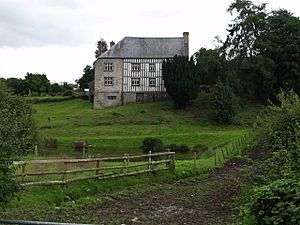Lewys Glyn Cothi facts for kids
Lewys Glyn Cothi (born around 1420 – died around 1490), also known as Llywelyn y Glyn, was an important Welsh poet in the 1400s. He wrote many poems in the Welsh language. He was one of the most famous "Poets of the Nobility" (called Beirdd yr Uchelwyr in Welsh) or "cywydd-men" (Cywyddwyr). These were traveling professional poets who wrote for important people between the late 1200s and early 1600s.
Lewys's Life Story
Lewys Glyn Cothi was born around 1420. He might have been born at a farm called Pwllcynbyd, near a small village named Rhydycymerau in south-west Wales. He chose his poet's name, Glyn Cothi, from a nearby forest in the Cothi valley. His real name was Llewelyn, but he often used the shorter, more common name "Lewys" in his poems.
We don't know much about his early life. One old book suggests he might have gone to school at Carmarthen Priory.

Lewys lived during a time of big wars in England called the Wars of the Roses. He supported the Lancastrian side, which was one of the two main groups fighting for the throne. He was a supporter of Jasper Tudor, who was the Earl of Pembroke, and later of Henry Tudor.
It's believed that Lewys saw the Lancastrian army lose a battle called the Battle of Mortimer's Cross. After this, he and a friend named Owen ap Gruffudd ap Nicolas had to hide in Snowdonia to avoid being caught. Even though many of his poems were for Lancastrian supporters, he also wrote poems praising people from the other side, the Yorkists, when it was helpful. For example, he wrote for the Vaughan family of Hergest, who were Yorkists.
There's a story that Lewys moved to Chester. Some say he was forced to leave the city because he married a widow without the city leaders' permission. Other stories say he was kicked out because he wrote a poem predicting that Henry Tudor would become king, and Chester was a strong Yorkist city. Whatever happened, it seems the people of Chester made fun of him. In return, Lewys wrote a very funny and angry poem making fun of them!
Lewys traveled all over Wales, visiting the homes of different important people who supported him. He especially loved Anglesey, an island off the coast of Wales. He wrote about how welcoming the people there were, saying, "Blackened are the trees of Ireland / by the smoke of the kitchens of Anglesey." This meant that so many kitchens were cooking in Anglesey that the smoke reached Ireland!
A Sad Loss
Lewys had at least one son named John. Sadly, John died when he was only 5 years old. Lewys wrote one of his most powerful and sad poems, called Marwnad Siôn y Glyn (which means "Elegy for John of the Glyn"), about his son's death. Here are some lines from it:
|
Yngo y saif angau Siôn |
Siôn's death stands near me |
Lewys Glyn Cothi is thought to have died around 1490. Some people believe he was buried in a place called Abergwili, but we don't know for sure when he died or where he was buried. One of his last poems was written for Henry Tudor after he became King Henry VII.
Lewys's Poems and Books
Lewys was a very busy poet. He wrote many poems celebrating people and also sad poems (called elegies) when someone died. About 230 of his poems still exist today in old handwritten books. His style of writing was "fluent and natural," even if it wasn't always as fancy as some other poets.
His poems covered many topics, from praising important people and writing religious verses to using lots of humor. He especially used humor when he was asking his supporters for gifts!
Lewys was also very good at copying books by hand. He is believed to have put together most of the Llyfr Gwyn Hergest (the White Book of Hergest), which was a very important Welsh book from the Middle Ages. This book disappeared in the early 1800s. He also added some of his poems to the Red Book of Hergest, which is now kept at the National Library of Wales.
Lewys was also an expert on heraldry, which is the study of coats of arms and family symbols. He wrote several books about this topic. One old book, called Peniarth 109, has over a hundred of his poems written in his own handwriting. He even drew the coats of arms of many Welsh noble families in it!
All of Lewys Glyn Cothi's poems were published together in 1953. This was done by the National Library of Wales and the University of Wales Press Board.
Images for kids
-
Hergest Court in Herefordshire was a large home of the Vaughan family, who supported Lewys Glyn Cothi. Important old Welsh books like the White Book of Hergest and the Red Book of Hergest were once kept here.
 | James B. Knighten |
 | Azellia White |
 | Willa Brown |


